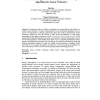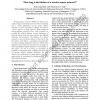1367 search results - page 143 / 274 » Hypercube-based Data Gathering in Wireless Sensor Networks |
100
click to vote
JUCS
2007
14 years 9 months ago
2007
: Clustering provides an effective mechanism for energy-efficient data delivery in wireless sensor networks. To reduce communication cost, most clustering algorithms rely on a sens...
AINA
2009
IEEE
15 years 3 months ago
2009
IEEE
Wireless sensor networks (WSNs) are known to be highly energy-constrained and each network’s lifetime has a strong dependence on the nodes’ battery capacity. As such, the netw...
127
click to vote
FBIT
2007
IEEE
15 years 4 months ago
2007
IEEE
In Wireless Sensor Networks (WSNs), address-based routing approaches often lead to severe problems due to node mobility, energy-saving sleep-cycles, and often missing or unreliabl...
163
click to vote
ICDE
2007
IEEE
15 years 11 months ago
2007
IEEE
Current distributed database and stream processing systems assume that the network connecting nodes in the data processor is "always on," and that the absence of a netwo...
118
click to vote
IEEESCC
2009
IEEE
15 years 4 months ago
2009
IEEE
Wireless sensor networks are application specific, data centric networks where different applications run on deployed network. Each application interprets the underlying sensor n...


